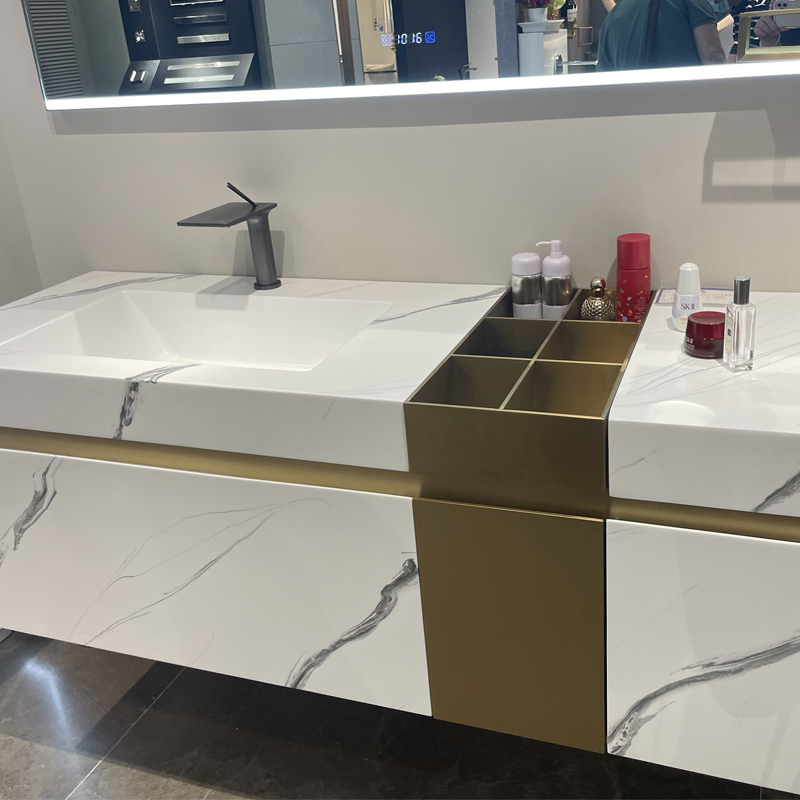
As consumers become increasingly aware of the environmental impact of their choices, sustainable and eco-friendly materials have gained significant popularity in home design, particularly in bathroom furnishings. Artificial Stone, a versatile material commonly used for bathroom vanities, offers a range of eco-friendly benefits that make it a perfect choice for environmentally conscious homeowners. From its use of recycled materials to its energy-efficient manufacturing process, Artificial Stone is a sustainable alternative to traditional materials like natural stone and wood.

One of the key eco-friendly aspects of Artificial Stone is that it is often made from recycled materials. Manufacturers can incorporate post-consumer recycled content, such as crushed stone, glass, and resins, to create Artificial Stone products. This reduces the need for raw materials, helping to minimize environmental waste. For instance, some artificial stones may include recycled marble dust or quartz, both of which are byproducts of stone cutting and polishing. By repurposing these materials, the production of artificial stone reduces the carbon footprint associated with mining and extraction, making it a more sustainable option compared to natural stone.
The production process of artificial stone is typically more energy-efficient than that of natural stone. Mining, cutting, and transporting large slabs of natural stone can be highly energy-intensive, particularly when the stone is sourced from distant locations. In contrast, artificial stone is manufactured using less energy, as the production process generally involves mixing natural minerals with resins and binding agents, then curing the mixture. The process is less resource-intensive and produces fewer carbon emissions, making artificial stone an environmentally friendly alternative. Moreover, the manufacturing of artificial stone is often done closer to the consumer market, reducing the environmental impact of long-distance shipping.
Artificial stone is known for its exceptional durability and longevity, making it an excellent investment for bathroom vanities. Its scratch-resistant, stain-resistant, and non-porous surface means it requires fewer replacements over time. As a result, the material contributes to less waste, as homeowners do not need to replace or dispose of damaged vanity surfaces frequently. Additionally, artificial stone's resistance to moisture and heat makes it ideal for bathroom environments, further enhancing its longevity. This durability helps reduce the environmental impact of replacing damaged or worn-out bathroom materials, contributing to a longer life cycle for the vanity.
Unlike natural stone, which may require regular sealing to prevent staining or damage, artificial stone is extremely low-maintenance. The non-porous surface of artificial stone bathroom vanities means they do not harbor bacteria, mold, or mildew, reducing the need for harsh cleaning chemicals that could negatively affect the environment. Regular cleaning typically requires only mild soap and water, which is less harmful to the environment than chemical cleaners used for other surfaces. As a result, artificial stone not only lasts longer but also supports a healthier, eco-friendly home environment.
Artificial stone bathroom vanities are designed to be highly resistant to moisture, which helps reduce the need for excessive water usage during cleaning and maintenance. The non-porous surface does not absorb water, which reduces the risk of water damage or mold growth that often leads to costly repairs and replacements. This makes artificial stone an ideal material for eco-conscious consumers who want to minimize water waste in their homes, especially in a high-moisture area like the bathroom.
In addition to being made from recycled materials, artificial stone itself can be recycled at the end of its lifespan. Many manufacturers offer recycling programs for artificial stone products, ensuring that the material does not end up in landfills. When artificial stone is no longer in use, it can be repurposed into new surfaces or even used for construction materials, reducing waste and promoting a circular economy. This makes artificial stone an attractive choice for homeowners who are committed to sustainability and reducing their environmental impact.
Artificial stone offers an aesthetic variety that closely mimics natural stone surfaces, but without the need to quarry large amounts of raw stone. This reduces the environmental damage caused by mining, which can lead to habitat destruction and soil erosion. Artificial stone can be produced in a wide range of colors, patterns, and finishes, allowing homeowners to achieve the look they desire without contributing to the depletion of natural resources.
Artificial stone bathroom vanities are a fantastic option for environmentally conscious consumers looking to make sustainable choices for their home. From their use of recycled materials to energy-efficient production methods, durability, low-maintenance nature, and recyclability, artificial stone offers numerous eco-friendly benefits. By choosing artificial stone for bathroom vanities, homeowners can enjoy a stylish and functional product that not only enhances their living space but also helps reduce their overall environmental footprint. With sustainability becoming an increasingly important factor in design decisions, artificial stone presents a smart, green choice for those seeking to create a more sustainable and eco-friendly bathroom.